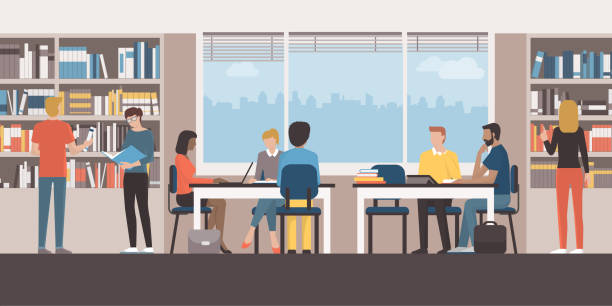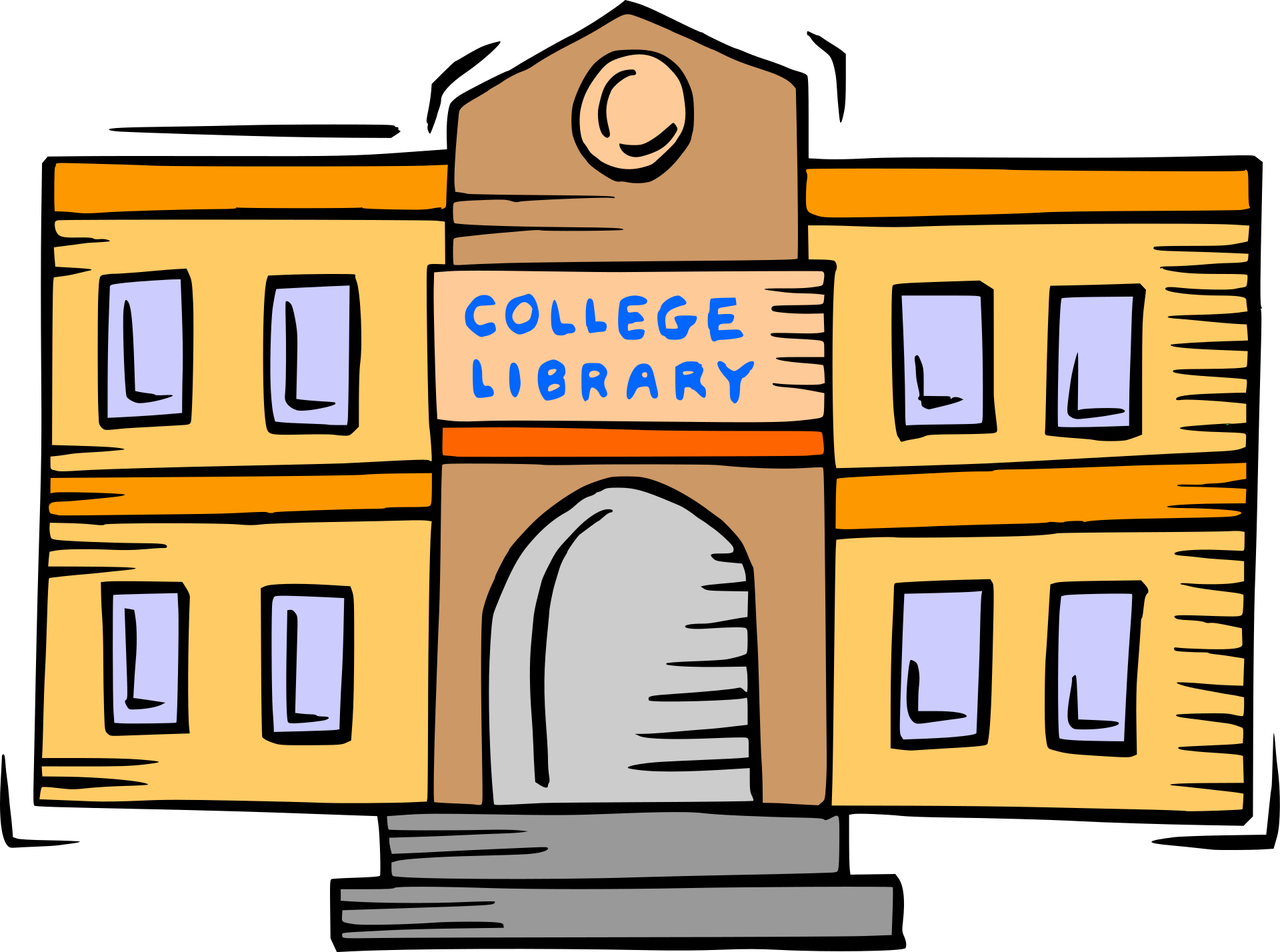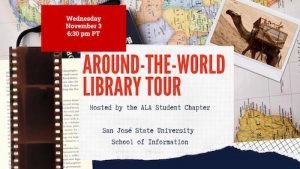iSchool Classmates that work in Academic Libraries

Previously, I wrote a post about working in public libraries that my peers and I were able to provide feedback on. I thought to expand the idea to other professions in librarianship other than my own to learn from those who have first-hand experience in the field.
What drew you to academic libraries?
R: I adore research. I love learning new things. Working at the Research Center at CSUF they had a saying, “students come in and teach you about their topic, and we teach them how to find information about it.” It’s a two way street of learning, collaboration, and a research journey of discovery that just lights my heart up. To me it feels like a real life video game, with side quests, dead ends, new worlds that open up and require continual creative problem solving and communication. And the bigger the sea of information is, the more complex the databases, search engines, paywalls, and institutional tape gets, the more students will need information literacy professionals to act as guides in their research/learning journey. The more students realize that Google is just scratching the surface, and Google Scholar works with publishers to sell you information libraries can provide you for free – the more this complex and difficult this world gets, the more academic librarians act as captains of ships on that infinite sea of information, and the journey to new research is exciting, perilous and fun. I want to continue to learn and grow and study new things and be challenged every day, and that is a possibility in academic libraries.
M: I discovered the field of librarianship in my first semester at an English Composition & Literature master’s program! An academic librarian was a guest lecturer in our entry-level graduate research methods class, and when she introduced herself she mentioned how she had an MLIS, and what sort of work she did at the university, exemplifying the types of research assistance that she and other academic librarians could provide for us throughout our academic journeys. After her lecture, I found myself thinking “Oh shoot – did I choose the wrong degree?! How have I never heard of a MLIS program before? Or librarianship for that matter?!” 🙂 I stuck with my English degree, thankfully (English literature and research are my research passions) but I never forgot my initial inspired interest in Academic Librarianship. I earned a Library Technology certificate in 2019, and started working as a Library Technician in community colleges that same year! In addition to this role, I’m also interning at my alma mater university as a Reference Librarian intern, hoping to garner instructional librarian experience, for which, in my current position as a Library Technician, I’m not expected to do.
E: After working at the public library as a page for a year during a global pandemic and a hiring freeze, I felt I was ready for a new position. Every night one of the jobs I googled was “library assistant.” One night, I got lucky and discovered a job at a small medical university on the other side of town. I was applying to SJSU at the same time as I was applying to the job posting and happily found myself accepted to both!
What do you do for your job?
R: I work as “Reference Desk Two” at California State University’s Research Center (which was rebranded from Reference because students didn’t relate to that term). I do one-on-one research consultations with any student, faculty or community member who walks up, over IM LibGuide Chat, and over the phone. I use all the CSUF databases, libguides and record the interaction with Springshare for future library evaluation of services. I also shadow academic reference librarians doing information literacy instruction to discover best practices and elements I want to integrate into my own IL sessions.
M: As a Library Technician at a community college library I attend to circulation duties, catalog items brought in from acquisitions, process those items for shelf-readiness, and manage student workers, introducing and training them for potentially pursuing librarianship further! As a Reference Librarian intern, I help out at the Reference Desk (helping students research effectively, whether that be finding resources or developing their research topics) edit and create LibGuides, and teach library instruction workshops!
E: In December, I was promoted to Interim Research & Learning Librarian and Liaison to the College of Pharmacy. I still don’t know what I’m doing! So far, I have instructed first-year pharmacy students on drug information and research, helped organize the university’s annual research symposium, assisted with AMA citations, and edited the resource guides for pharmacy. I also am starting to develop relationships with faculty– but there’s still so much more to do and learn!
What’s your favorite part of the job?
R: Every day there are new and different questions with new challenges. I learn about new resources, different search strategies, academic library culture, and witness how each seasoned academic librarian has a different approach that is personalized to their subject specialty. I’ve witnessed how each librarian’s information literacy approach is so unique and I get to learn and adopt elements of their practice into my own. I get to connect with new and different kinds of people studying a vast array of topics, many of which I know nothing about, and get to learn along with them. It’s less of a teaching relationship and more of a journey with a new friend where we both have tools and knowledge we’ll share to get the job done.
M: My favorite part of working at a library is, undoubtedly, having the chance to connect with students. I love getting to know students as they frequent the library in a semester, and staying in the loop with their academic journeys! Furthermore, the rapport I could build with students as a library employee is different than the type I could build with them as an instructor. My initial goal was to be an English college instructor, but after a year teaching in that capacity, the role became evident to me as an authority role – because instructors assign grades, there’s an air of intimidation from students towards instructors and they’re not likely to seek support or assistance, generally. But as a library worker? Our role is to support students’ success, and link them to invaluable resources, physical, digital, or even places, and because of this, I find that librarians and library staff are more approachable in students’ eyes. I love that!
E: The students! Everything said above is true. One of my students walked into my office, plopped down, and remarked, “You know, you’re kind of a guidance counselor.” I laughed. It’s always great to build these kinds of open relationships with students where they feel free to speak their minds.
What do you find most challenging?
R: Academic libraries are notoriously classist, and require years of unpaid and low paid labor for even a chance at a full time librarian position. This is the environment where I’d like to work for the next thirty years. I’ve never been in an environment before this one, where I felt something inside myself say, “Yes, this is it, these are your people, this is where you want to learn and grow and contribute for the rest of your life!!” While having this internal confirmation is wonderful and I celebrate it, it could be years before I get an opportunity for a full time librarian position, and there are many internal politics and variables I cannot account for as I apply for these kinds of jobs.
M: I think that the biggest challenge that libraries everywhere, in all types of libraries, are facing currently, is reeling patrons into our spaces, and this is the case in academic libraries too. I think that major perspective shifts need to be considered for academic libraries to be welcoming environments for students, particularly in the department of breaking library stereotypes. One such stereotype that comes to mind is how every section of a library needs to be absolutely quiet – at the library I’m interning at, a more dynamic approach is being practiced, where the entry level of the library is a noisy area, where study groups are encouraged to be chatty and invited with wide spaces for them to convene. In other levels/sections of the library, though, there are quiet study spaces, too. Being all-inclusive for students’ every need is essential if we’re hoping to be an inviting space for students!
E: Learning the curriculum, devising ways to fit literacy and information science into it, and convincing faculty that it’s necessary and that the library needs to be in their classrooms. It’s a lot of relationship building, and it’s taking some time because I get so shy around such impressive people! I’m definitely working on it– it’s all about confidence.
Do you have any career goals you are working towards?
R: I just had an hour long interview for my dream job -that I recognize would be like winning the lottery for someone just coming out of an MLIS program to get, but I got an interview so it’s a start! It is an Art Makerspace Reference Librarian position with a focus on collaboration between departments, faculty liasoning, innovation, research, information literacy instruction, outreach and ongoing learning -it literally hits all my favorite elements of life and felt like it was describing every element of who I am. I want to continue research, eventually -long term, I want to get a PhD in Information Literacy exploring the philosophy of knowledge creation mirroring information literacy behaviors in the arts and across disciplines. It might be a long uphill battle, but it’s one I believe is worth the journey.
M: I’m hoping to mesh my academic interests of English Literature/Composition and Academic Librarianship by becoming a Literature liaison librarian, or an Instructional Librarian! Furthermore, down the line, my goal is to earn a PhD in English Literature, which I feel will be a doable goal as an information professional – by being in this field, we’re natural researchers! I am excited for the journey ahead, and I look forward to, both, the challenges and rewards that will come along with it.
E: I am working towards being a better liaison for our faculty and a better instructor for our students. Both of these involve staying current on tools that professional pharmacists need to know to be successful in the field, as well as keeping up with library trends in instruction design.
Thank you for those who provided their responses. If you have any thoughts about any of the questions or responses, feel free to write them in the comments below!

